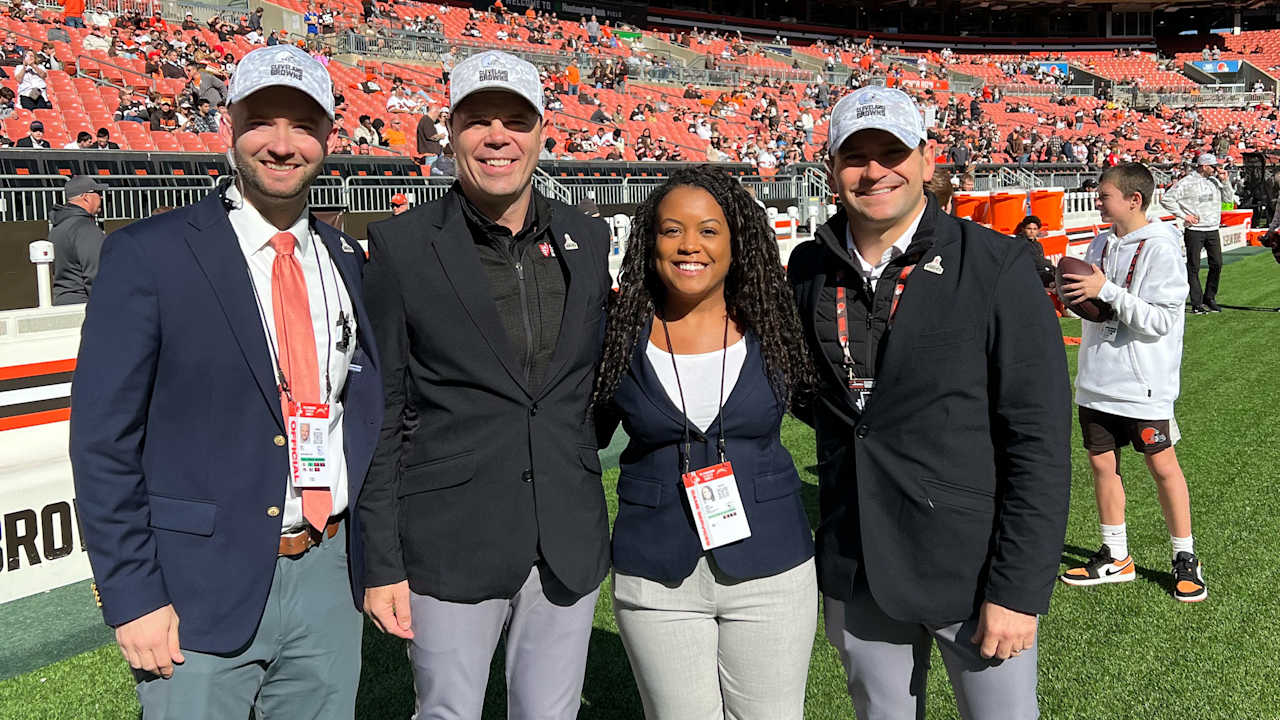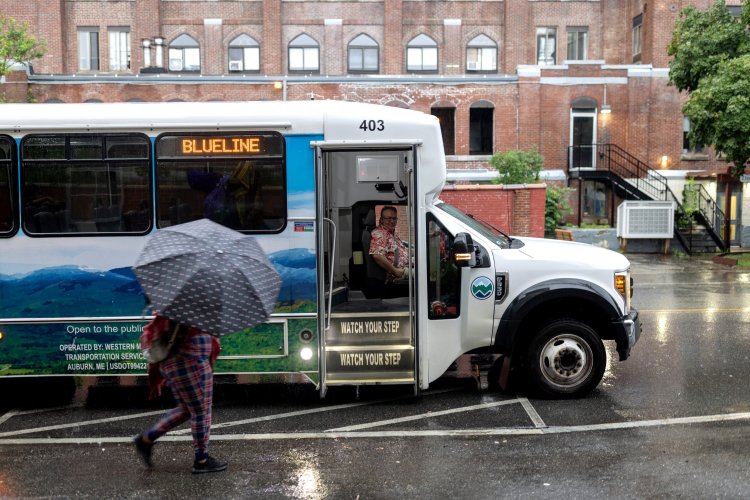
A Gagné Foods employee gets on a Western Maine Transportation Services bus that will drop them off at work after making stops in Lisbon, Brunswick and Topsham in July. Brianna Soukup/Staff Photographer
It’s a little before 6:30 a.m. and raining steadily when the bus stops at the corner of Birch and Bates streets in downtown Lewiston.
The door opens, and a dozen people climb the steps in a stream of brightly colored dresses, bulging backpacks and collapsing umbrellas.
One of the riders is Françoise Mutangidi, 59, from the Democratic Republic of the Congo, who came to Maine three years ago from a refugee camp in Zambia.
Like most of the 16 passengers, Mutangidi is heading to Gagné Foods in Bath, where she is a line worker making a variety of private-label, freezer-to-oven baked goods that are sold across the country by supermarkets and other retailers, including Costco.
The bus, paid for by the company and supported by a state grant, is why Mutangidi can work at Gagné Foods, which is a 40-minute drive from her home.
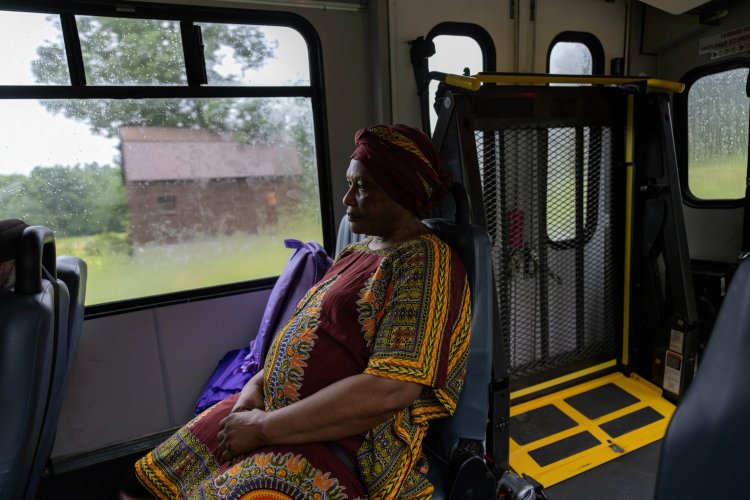

Francoise Mutangidi, 59, of Lewiston, rides a Western Maine Transportation bus to her workplace, Gagné Foods, in July. Brianna Soukup/Staff Photographer
“I don’t have a car,” she said. “This bus helps everyone here get a good job. Gagné Foods is a good company.”
Gagné Foods is among a growing number of Maine companies and institutions that are striving to hire recent immigrants in a labor shortage, and reshaping themselves to meet the newcomers’ needs in the workplace and beyond.
In addition to free transportation, Gagné Foods provides interpreter services and translations of food safety exams and regulations. The employee handbook and worker-directed signs throughout the 20,000-square-foot plant are translated into Lingala, Swahili, French, Portuguese and other languages as needed.
Workers earn $16 to $25 an hour, depending on their positions and length of employment, with paid vacation, holiday and sick time, a health insurance stipend and regular bonuses. Almost half of the 50 workers at Gagné Foods are immigrants.
It’s something of a personal mission for owner Michael Gagné, who basically enjoys helping people. Against the advice of family and friends, he occasionally lends money to an employee to rent an apartment, pay a medical bill or buy a used car. Over the years he’s loaned about $100,000, he figures, and been repaid for all but $450.
“If someone comes to me and needs a hand, if I can afford it, I’ll do it,” he said.
But mostly, Gagné said, welcoming immigrants into his company has proved to be a practical solution to the significant challenge of running a business in a tight job market where dependable workers can be scarce.
“It’s a blessing,” said Gagné, 70, as he watched his workers packaging flash-frozen, peach-filled pie bites.
“I’ve been hiring people for over 50 years,” he continued. “Entry-level staffing has always been problematic, but lately it’s been nearly impossible. Bringing in people from different cultures who speak different languages has been difficult, but it’s worth it.”
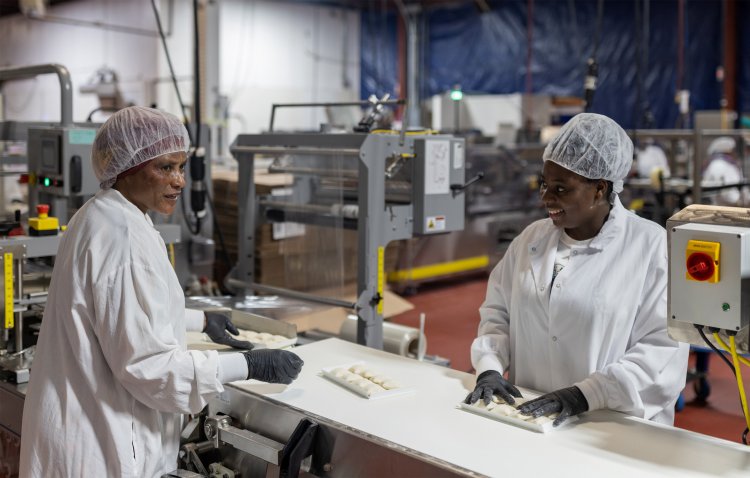

Francoise Mutangidi, left, and Mwajuma Mateso, right, work at Gagné Foods on July 22. Brianna Soukup/Staff Photographer
HIRING MORE NEWCOMERS
Hiring recent immigrants isn’t new or unusual, but making an effort to do so is gaining steam in Maine’s anemic job market.
Recent immigrants and their children are expected to account for 83% of the growth in the U.S. workforce from 2000 to 2050, according to research by the National Skills Coalition cited in a 2016 report from the Maine State Chamber of Commerce and Maine Development Foundation.
Gov. Janet Mills’ 10-year economic strategy, through 2029, calls for adding 75,000 workers to the state’s workforce and highlights the contribution immigrants could make with more effective processes for professional licensing and certification and expanded English language programs.
In April, lawmakers approved Mills’ request to create an Office of New Americans, expected to open later this year, aimed at helping immigrants adjust to living and working in Maine. One of its goals is to identify “roadblocks in skill development and credentialing in order to create access to high quality work opportunities.”
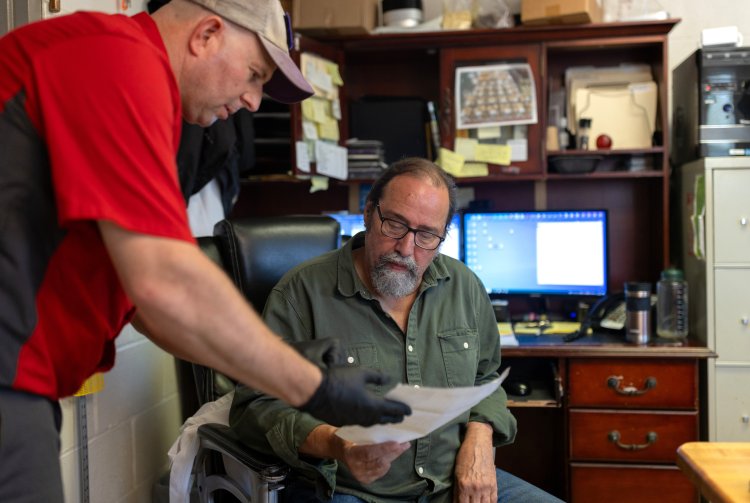

Michael Gagné looks over an order in the office at Gagné Foods on July 22. Gagné started the business in 2006 after years of owning a restaurant in Georgetown. Brianna Soukup/Staff Photographer
Connecting immigrants and employers is central to the work being done by the Peer Workforce Navigator Project, a coalition including nonprofits Prosperity Maine, Maine Equal Justice, Gateway Community Services Maine and the Maine AFL-CIO and the state’s Department of Labor.
Funded by the Mills administration, the project holds weekly clinics to help immigrants build resumes and find jobs at Prosperity Maine, a Portland nonprofit that promotes economic independence of new Mainers.
“We have seen over 1,000 individuals coming to workshops in the past year,” said Claude Rwaganje, Prosperity Maine’s founder and executive director. “Employers connect and interview applicants on the spot. More than 200 people came to apply for jobs at one construction company.”
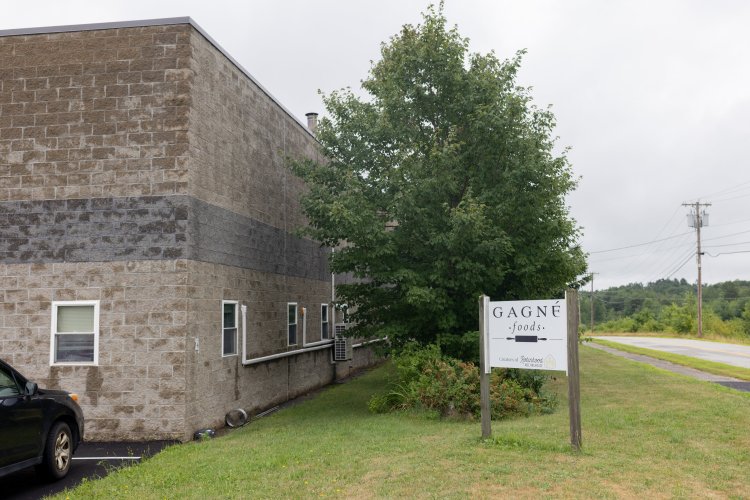

Gagné Foods in Bath. Brianna Soukup/Staff Photographer
Efforts to hire immigrants are widespread, Rwaganje said. Northern Maine Community College in Presque Isle is leading an effort to recruit them to live and work in Aroostook County, and a major supermarket chain recently contacted Prosperity Maine seeking immigrants to work at York County locations.
“They were willing to provide transportation from Portland and pay $18 an hour,” Rwaganje said. “It shows how desperate some Maine businesses and institutions are for good workers.”
‘WE COULDN’T FIND EMPLOYEES’
Gagné Foods ran into serious staffing challenges in 2019 – and they only grew worse when the pandemic hit the following year.
It was an unfortunate coincidence for Gagné, who was finally feeling free of the 2008-09 recession that almost grounded his fledgling company as it was taking flight.
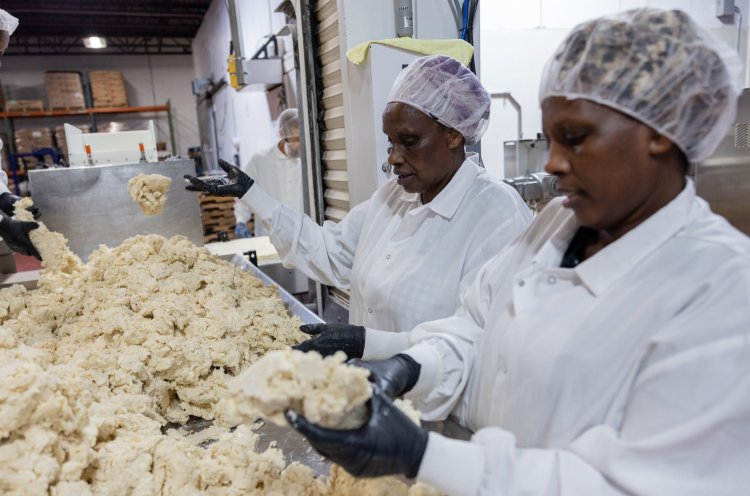

Ange Namahoro, left, and Kamakazi Nyagichumbi prepare the pie dough to go into the hopper at Gagné Foods on July 22. Brianna Soukup/Staff Photographer
A classically trained chef who grew up in Biddeford, Gagné launched the company in 2002 from the back of Robinhood Meetinghouse, the Georgetown restaurant he owned for 17 years. He started with his trademark 24-layer biscuits made with butter and cream cheese, which he realized were wholesale-worthy when diners kept asking for seconds.
In 2006, the biscuit business brought in $275,000 and won a Sofi for best baked product at the prestigious Summer Fancy Food Show in New York City. The next year he moved the company to Bath and annual production grew to $795,000. Then the recession hit.
“That recession brought me to my knees,” Gagné said. “I leveraged my restaurant, my house and my brother’s house. I spent eight years digging out. But I always say, you can’t lose if you don’t quit. I was advised to go bankrupt several times, but I never did.”
So, when staffing troubles cropped up 10 years later, rather than cut production, Gagné established a hiring line and training program for recent immigrants who were clients of Catholic Charities Maine.
“We couldn’t find employees,” said Sharon Harren, finance director. “We reached out to Catholic Charities, and by 2020 we were onboarding 15 to 20 immigrants. It was an enlightening experience. It still is.”
THE TRANSPORTATION SOLUTION
During the pandemic, as U.S.-born workers dropped shifts at Gagné Foods, foreign-born employees kept showing up, Gagné said.
“They were dependable and glad to be here,” he said. “Then transportation became an issue.”
Many of the workers who lived in Lewiston didn’t own cars. Gagné contacted Western Maine Transportation Services in Auburn to see if a commuter bus route could be added from Lewiston to Bath. Under their agreement, Gagné has paid as much as $30,000 annually to keep the shuttle running each weekday morning and afternoon. His workers don’t have to pay fares.
Known as the BlueLine Commuter Bus, it’s open to the public, who pay up to $5 one way. It includes several other stops in Lewiston, Lisbon, Topsham, Brunswick and Bath. It also includes a midday run that doesn’t stop at Gagné Foods.
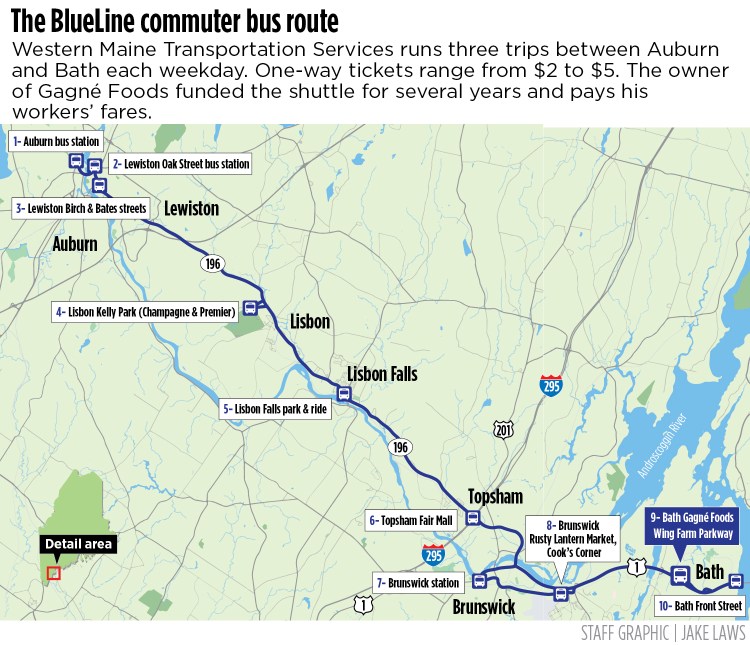

“Western Maine Transportation has been an excellent partner,” Gagné said. “As the situation changed, we morphed our agreement.”
In April, the Mills administration announced that Gagné Foods would get a $27,384 grant from the Maine Jobs & Recovery Plan to support the bus line.
The grant program supports workforce transportation solutions to help employers “grow and retain their workforce while knocking down barriers for qualified workers to find good-paying careers,” Mills said at the time.
“Connecting workers with employers eager to hire is good for Maine businesses and Maine’s economy,” the governor said.
The bus route sponsored by Gagné Foods is helping other commuters as well.
Two men rode the bus recently because they were heading to Southern Maine Community College’s Midcoast Campus at Brunswick Landing. They were taking a welding course that is a prerequisite to getting a job at Bath Iron Works. When the bus stopped at the Rusty Lantern in Brunswick, they transferred to the Brunswick Link, which took them directly to the college.


Ange Namahoro, center, rides a Western Maine Transportation Services bus that will make stops in Lisbon, Brunswick, Topsham and at her workplace, Gagné Foods, in Bath on July 22. Brianna Soukup/Staff Photographer
“I don’t have a car right now, so this has been a big help,” said Adonia Labbe, 46, of Lewiston.
“I’m trying to start a future for my fiancee and me,” said Dameon Yontz, 20, a former firefighter who lives in Lisbon. “My fiancee found this bus run online. I had no other way to get there.”
NONPROFIT PIPELINE
More than 40 clients of Catholic Charities Maine have gone to work for Gagné Foods since 2019, said Charles Mugabe, the nonprofit agency’s director of migration.
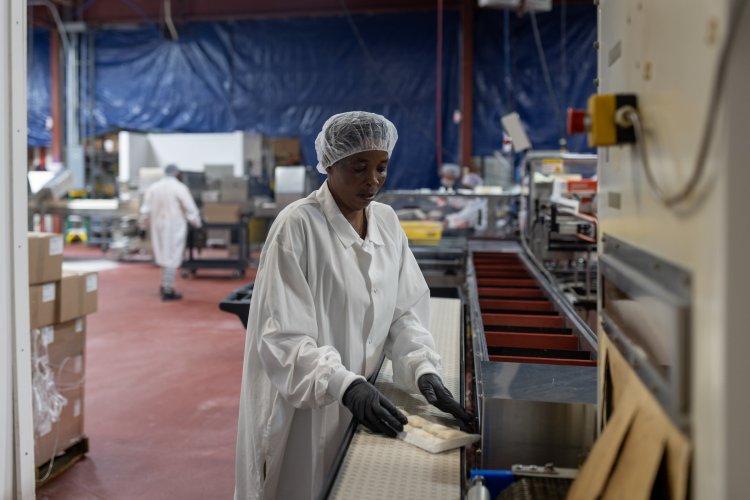

Nyiramazayire Imanimfashe works the line at Gagné Foods on July 22. Brianna Soukup/Staff Photographer
Mugabe praised Gagné Foods for its commitment to hiring newcomers and tackling challenges that threaten job retention, including language barriers and lack of transportation.
“Most of the people coming here have big dreams,” Mugabe said. “We want our clients to become self-sufficient. They cannot do that without jobs, but transportation remains a major challenge because Maine does not have reliable transportation alternatives.”
Other companies that work with Catholic Charities to employ new Mainers include Maine Medical Center, Mercy Hospital and Paradigm Windows in Portland; Abbott Laboratories in Scarborough; American Roots in Westbrook, Capstone Logistics and Goodwill Northern New England.
“Some companies hire (new Mainers) and give up when it’s challenging,” Mugabe said. “These companies are models for others.”
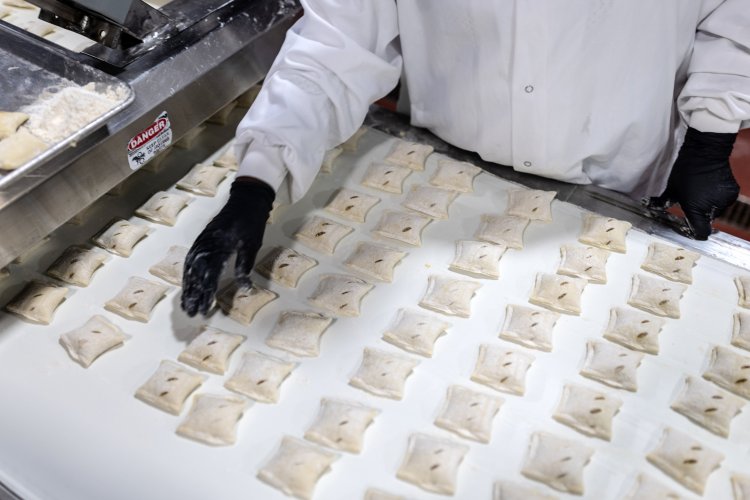

An employee straightens the pie bites on the line at Gagné Foods on July 22. Brianna Soukup/Staff Photographer
Today, with a full complement of employees, the product line at Gagné Foods includes biscuits, cinnamon rolls, fruit pie bites, hand pies and rustic tarts, most sold by major retailers under private labels. Some are sold under the Robinhood Meetinghouse label at Brackett’s Market in Bath, Morning Glory Natural Foods in Brunswick, Royal River Natural Foods in Freeport and Pond Cove IGA in Cape Elizabeth.
LEARNING BY DOING
Gagné knew the benefits of hiring new Mainers before connecting with Catholic Charities. In 2012, he hired Adnan Baseleh, a successful businessman in Syria before war forced him to flee his home.
“He distinguished himself very quickly,” Gagné said. “He learned how to speak English. He learned each and every aspect of working the floor and eventually became plant manager. And that was before he introduced me to my wife.”
Gagné, who lives in Georgetown, is now married to Baseleh’s sister-in-law, who is from Jordan. Together, the couple have six children and four grandchildren. Baseleh and his wife have three children and live in Bath.
Baseleh’s rapid rise to plant manager prompted racist reactions from some employees, which he and Gagné said they worked to overcome. Cultural differences also create issues occasionally among employees from different countries, they said.
“It’s a lot of work,” said Baseleh, 37. “(Gagné) has the heart for it. He’s very caring about immigrants. I’ve learned a lot from him. This company has given me a lot. It’s a good example. Other companies should give immigrants a chance.”
Musa Anzuruni, 24, of Lewiston, rapidly rose to packaging supervisor. He came to Maine from Tanzania four years ago and began working at Gagné Foods soon after. His father, who was born in the Democratic Republic of the Congo, also works there.
It helps that Anzuruni speaks four language – Kibembe, Swahili, French and English – but he didn’t always.
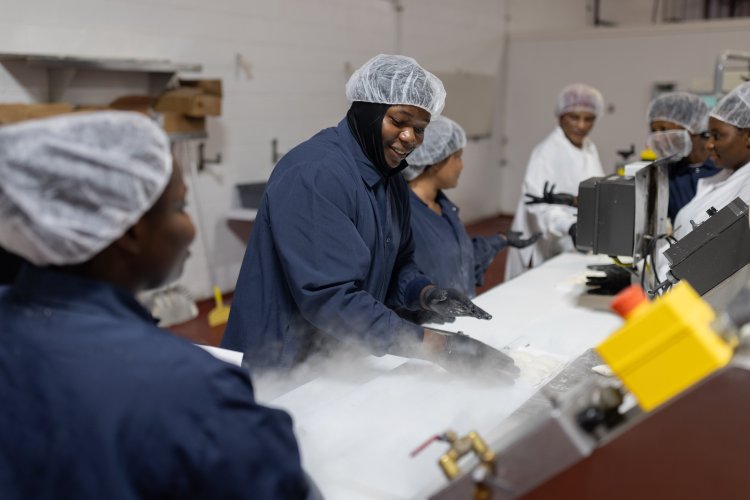

Musa Anzuruni, 24, a packaging supervisor at Gagné Foods, works the line on July 22. He came to Maine from Tanzania four years ago and began working at Gagné Foods soon after. His father, Anzuruni Moyo, also works there. Brianna Soukup/Staff Photographer
“When I started here, I was zero in English,” Anzuruni said during a break. “Other places, they wouldn’t take me. But I like to learn new things, and this place gave me a chance. Now I can run every machine here.”
Anzuruni will graduate soon from Lewiston Adult Education, he said, but it took him a few years to get the equivalent of a high school degree while working full time.
Both Baseleh and Gagné see persistent gaps in recent immigrants’ transition into Maine’s job market. It’s difficult to take English classes while working, sometimes more than one job. They’re trying to figure out a way to offer classes through the workplace.
And they both believe the federal immigration process needs to be streamlined to make it easier for newcomers, especially asylum seekers, to start working. Asylum seekers are not allowed to seek work permits until at least six months after filing their asylum applications, which can take over a year to complete. The federal government has denied requests to expedite the process.
“We should be welcoming immigrants, not putting up barriers,” Gagné said. “We should be fast-tracking work permits, not making them wait months and years. Most of the time they’ve escaped dire situations, and they can’t wait to get to work.”
Related Stories





